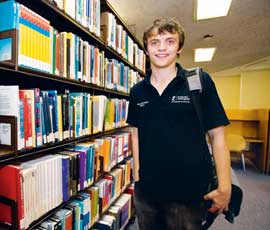These student days have been first class

21-year-old Michael Neaverson studied Crop Science at the University of Nottingham.
It’s official – I am no longer a student.
I’m not sure whether this is a good or a bad thing though. I may be entering the world of paid employment, but it also means that I can’t claim a student discount anymore. It looks like I’m actually going to have to pay for ice cream at McDonald’s now.
The end of student benefits aside, the fortnight after the last exam is generally quite a strange time in the university calendar. A selection of students will be required to attend something called a “viva” that basically involves being quizzed by a lecturer from another university for half an hour, generally about anything that they fancy from your entire course.
You can be selected for such an exam for two main reasons: to act as a benchmark to help standardise grades across all universities running the same course, and also if you are just under a grade boundary. The trouble is that they don’t tell you which one of these scenarios you fit into, and – true to form – I was selected for one.
Thankfully, though, when results were published on a noticeboard for all to see the next day, I found out that I had been a “benchmarker”. Well over 100,000 words of coursework, 27 exams and three years after starting, I’ve left with a left Nottingham with a first classified degree – somehow.
Following the summer ball (which, by the way, was excellent – see www.fwi.co.uk/collegecalendar), the task of moving three years of accumulated rubbish back home began. Trying to squeeze it all in the back of a VW Polo was a bit like playing Tetris, but after a few minutes spent wrestling with a clothes horse, I finally got the boot lid shut.
The first job on the list at home was – as ever – sweeping the corn store out, followed by a few days roguing cress, wheat and barley. It is clear that the cereals have some excellent yield potential, but also that harvest is likely to be a very late affair compared to normal.
One of the happy surprises of this year has been our few hectares of Sakura marrowfats that look phenomenal considering the wet spring. We’re praying that they remain at chest height until harvest as combining flat peas is not a task favoured by many.
Back in the office, we’ve had a couple of enquiries from 15-year-olds looking for work experience on a farm as part of our local secondary school’s compulsory programme. Recruiting young people into the wider industry is incredibly important and work experience programmes such as this provide a perfect stepping stone to a college course.
The trouble is that bar sweeping sheds and roguing, there isn’t all that much that a 15-year-old can do at the end of June on a combinable crop farm. Some people might say that these jobs are just the sort of thing that you should get a work experience student to do, but I couldn’t disagree more.
These are people who are often not from a farming background, and just because their work experience fortnight corresponds with arguably the two most boring jobs of the arable year, doesn’t mean that you should abuse their free labour – as much you would probably like to.
Yes, work experience should be about teaching what a real working environment is like, but equally it is about showcasing an industry. A food critic couldn’t reliably review a restaurant based on a slice of toast, and neither can a young student appraise whether they want to work in the arable industry based on two weeks spent pulling weed beet in the rain. Like anything, it’s about taking the good jobs with the bad – and remember, you don’t have to pay them.
When I was doing the same work experience five years ago, I was very lucky to get a placement with an organisation that is related to – but very different from – agriculture: a Fenland drainage board. They mixed days spent in the office with days in the field surveying, and this broad mix of unpaid work is unfortunately not something that can be offered on a small arable farm at the end of June.
I gave the students who rang some contacts with some more varied enterprises. I hope they found somewhere to work because people like them will form the backbone of the agricultural work force in the future.
If you’ve enjoyed hearing about Michael’s adventures, you can continue to get his updates on the College Calendar blog. Plus, keep an eye out for our brand new student feature starting in the autumn.
